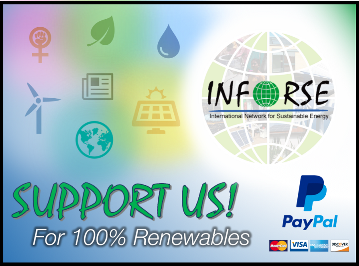| Follow Us: |
 |

|
|
 |
The first Global Conference on Renewable Energy Islands
|
|
 |
The conference attended by delegates from 34 islands and 22 organisations was held on the island of Aeroe from the 15-16th of September 1999. Below a description, Findings & Recommendations and the proceedings in PDF-format (for free)
|
|
|
The first Global Conference on Renewable Energy Islands
Aeroe Island, Denmark, 15-16 September 1999
The Global Conference on Renewable Energy Islands (GCREI) attended by delegates from 34 islands and 22 national, regional and international organisations on the Danish island of Ærø to share experiences and to discuss strategies for enhancing the use of renewable energy on islands. The conference examined the need to develop the renewable energy sector of their economies in line with the Program of Action agreed in Barbados by the 100 nations attending the 1994 Global Conference on the Sustainable Development of Small Island Developing States.
The conference was financed by the European Commission (SYNERGY- and Alterner-programme), the Danish Energy Agency, the Danish Council for Sustainable Energy and Forum for Energy and Development (FED).
Following are the findings of the conference and its recommendations to the UN General Assemblys Special Session on Islands, 27-28 September 1999, to the Commission for Sustainable Development at its ninth session, to the European Commission through the Small Islands Symposium in Brussels in November 1999, the World Conference and Exhibition on Renewable Energy in Bermuda 14-19 November 2000, and Rio Plus 10 in 2002.
FINDINGS
The following issues are considered by the GCREI to depict the present state of renewable energy on islands:
National and Regional Policies:
There is a need for national and regional policies and visions for renewable energy in a sustainable context.
Low Public Awareness:
Low public awareness of the critical importance renewable energy to sustainable development is lacking, especially amongst politicians.
Intra- and Interregional Co-operation:
There is a need to strengthen intra- and interregional co-operation among small island states.
Consolidation of Donor Efforts:
There is also a need for better consolidation of donor efforts.
Institutional Frameworks:
Institutional frameworks to support renewable energy are needed. On many islands, energy ministries are non-existent, and demonstration projects and other initiatives are too dependent on external expertise and/or individuals, rendering such initiatives non-sustainable.
Capacity Building:
There is a lack of capacity building in terms of human resources as well as of capacity building in organisations.
Appropriate Technologies:
Some renewable energy technologies are more competitive today, yet island experiences often date back to failures of the technology in the 1980s. Hence, there is a need for appropriate and best available technologies.
Real Costs:
Real costs of fuels and electricity on islands are not reflected in energy prices and tariffs.
Lack of Financing:
Lack of financing is often a barrier to renewable energy development on islands.
RECOMMENDATIONS
The GCREI recommends that the following issues and concrete proposals are taken into consideration by policy and decision-makers at the highest levels, and in particular by the international community in the UN General Assembly Session on Islands, to the United Nations Commission for Sustainable Development (CSD) at its ninth session in 2001, and to the Brussels Symposium on Small Islands in November 1999.
National and Regional Policies:
The Conference calls on all Small Island Developing States (SIDS) governments to adopt an integrated approach to renewable energy policy making and planning.
Renewable Energy at Cabinet Level:
All SIDS Governments should elevate renewable energy management to cabinet level.
Public Awareness:
Outreach initiatives should be taken to raise awareness among the public as well as political decision-makers of the critical importance of renewable energy to sustainable development.
Capacity Building:
Capacity building and training stressing the integral role of renewable energy should be encouraged at all levels. This includes, inter alia, training of relevance to policy development, operation and maintenance, management, and project development.
Co-operation: Secretariat for Renewable Energy Islands:
The Conference appeals to the Danish Government and the European Commission for assistance in setting up a secretariat on Renewable Energy Islands. The conference notes with appreciation the work of the Forum for Energy and Development (FED) and recommends that it serve as the secretariat. The proposed secretariat should work closely with the Alliance of Small Island States (AOSIS) and build on existing institutional structures. The secretariat should meet the needs for intra- and inter-regional and international coordination, cooperation and information dissemination. The secretariat should prepare a strategic communication plan, incorporating SIDSnet, to educate leaders and the public at large on the merits of renewable energy and to place renewable energy on islands at the forefront of international political and public agendas. Information flows on developments in the renewable energy field should be communicated to SIDS rapidly through SIDSnet and other available means. To improve clarity on available technology, best practices and guidelines should be identified. Specific renewable energy targets for SIDS and its donor communities should be established. Lists of island experts and consultants on renewable energy should be compiled by the secretariat.
Market Development of Renewable Energy:
Recognizing the key contributions of a dynamic private renewable energy sector, the conference calls for the establishment of an enabling policy and regulatory environment for market development of renewable energy. Entrepreneurship training should be encouraged.
Joint Ventures:
Private sector development should be promoted through mutually beneficial joint ventures between developing and developed countries enterprises.
Innovative Financing Mechanisms:
The development and utilisation of innovative financing mechanisms such as micro-financing should be identified and supported, and the ability of islands to access available sources of funding should be improved.
Clean Development Mechanism:
Recognizing the outcomes of the AOSIS Workshop on Clean Development Mechanisms (CDM) of the Kyoto Protocol to the UN Framework Convention on Climate Change (UNFCCC) in the Marshall Islands, the conference urges that CDMs, the World Bank Carbon Fund and other instruments of the UNFCCC should be used for supporting sustainable renewable energy development on SIDS.
Conference Approval of Action Plan:
The conference called for a meeting within the coming year to approve the action plan and the strategies prepared by the secretariat.
Next Annual Session at American Samoa:
The conference notes by acclamation the generous offer of the Governor of American Samoa, the Honorable Tauese Sunia, to host the next annual session of this conference, and pledges to work together with the American Samoan Government to bring this about.
FURTHER INFORMATION:
For more information:
While the Forum for Energy and Development was closed down in June 2002, the functions of the Island Secretaiat moved to the
Forum for Renewable Energy Islands, Samsoe Island, Denmark.
See at http://www.re-islands.org/
PROCEEDINGS
The proceedings in PDF-format (1.391 kb) can be downloaded below.
|
|
 |
Link: www.re-islands.org
|
|
 |
File: proceedings.pdf
|
|
|

